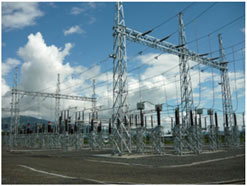Public Sector Advisory
Energy
An estimated 2.5 billion people remain without access to modern energy supplies. This shortfall is expected to grow as the population in developing countries continues to grow rapidly and the existing infrastructure ages. The United Nations’ goal of lowering poverty by half by 2015 will not be attained unless the poor in developing countries gain greater access to basic infrastructure and services, including energy services.
Energy sector is undergoing significant changes around the world. Former integrated activities are being unbundled. Regulated activities that remain are experiencing competitive pressures at different levels. New players are participating in the industry and new services and goods are being offered in competitive markets for industry clients. The drivers of change vary by their geography, as does the pace of change.
UNICON is committed to providing environmentally sound energy services, which help alleviate poverty and support broader economic development of countries. Our experts in energy policy, power sector reform and rehabilitation, regulation, utility management, electricity transmission and distribution, gas transportation, district heating and district cooling, renewable energy, and energy efficiency develop and implement effective strategies to address energy access, improve energy sector governance and rehabilitate energy system, support economic solutions and build the capacity of critical institutions.
On the basis of our experience in the energy sector and with energy-related activities, we are experienced in developing and implementing solutions for optimizing the energy process chain.
UNICON has assisted Utilities, Governments and International Financial Intuitions in their efforts to further the development of energy industry restructuring, including rehabilitation and restructuring vertically-integrated state-owned monopoly enterprises. UNICON has addressed the issues of industry structure, economic regulation, production, transport and distribution pricing. UNICON is also engaged in optimization studies of operations and assessment of existing plants in the energy sector and has advised promoting competitive conditions and the establishment of stable and well structured regulatory frameworks in those markets where restructuring is in a developing stage.
UNICON assists a range of public institutions in their major steps in the energy reform process. This includes:
Power Sector Reform: UNICON helps utilities in the process of power sector liberalization. Our activities include analysis of impacts of different reform options, design of the reform process, and technical support in the management and implementation of reforms. UNICON also assists in market design activities and various market instruments to promote investments in the power sector and adopt more appropriate pricing strategy.
Regulation and Pricing: UNICON works on the design and implementation of incentive regulatory systems in developing countries, as well as assist newly established (or re-established) regulators in their activities. Activities include pricing methodologies, tariff reviews, design of regulatory systems as well as capacity building and training.
Utility Restructuring: UNICON advices power sector utilities in developing countries on restructuring options and their implementation. Scope of our activities includes financial analysis, restructuring of business units, organizational restructuring, and the establishment of new transmission and distribution systems, transfer pricing, and institutional and financial arrangements for power supply.
Another field of UNICON’s activities is attracting private investments into the power sector, domestic and foreign, and assisting power regulators with risks involved. Lack of funding in the energy sector is a significant problem for developing countries which cannot be resolved by public funds or development aid alone. Private investment must therefore be attracted.
Energy is not a direct part of the UN’s Millennium Development Goals (MDGs), but energy is a major multiplier of efforts in reaching MDGs since it facilitates the general economic improvement of the country. For a country to achieve the MDGs, several key development issues would have to be addressed simultaneously, which include economic productivity, education, health, and gender. Energy is an integral component of all these issues, contributing to synergetic development impacts. There is a need to address energy considerations in broader development strategies, as well as the importance of quantifying links between energy and development to move beyond an intuitive understanding of how energy and development are related.
Our capabilities include, but not limited to:
- Energy Policy and Planning
- Commercialization and Energy Development
- Optimization of power plant development
- Energy conservation and efficiency
- Energy regulatory and restructuring assistance
- Tariff analysis and review
- Rural energy access
- Power system management
- Energy data management
- Network studies
- Hydropower development
- Hydropower and hydraulic structure design
- Planning, investigation and hydro resource survey
- Engineering designs for construction/rehabilitation of hydro power projects
- Planning, execution and renovation of old power plants
- Preparation of tender documents for power projects
Project on a Glance

Port Moresby Power Grid Development Project,
Papua New Guinea (PNG) has significant natural resources, including energy, but the country’s formidable geography and the high cost of developing infrastructure have constrained their exploitation. The outcome is a dual economy and society, marked by a few enclaves of industrialization surrounded by widely diffused poverty. The high population growth rate and increasing urbanization have increased difficulties for the country. The challenge is for PNG to use its energy resources to move the country toward more sustainable social and economic development.
Currently, there is no national power grid. The electricity network is located around more populated areas and industrial sites. PNG Power Limited (PPL), the national state-owned power utility, has installed generation capacity of 300 MW (80 MW in Port Moresby). At least another 280 MW belongs to other entities, most of which is used for self-consumption. Of the country’s total 580 MW generating capacity, hydropower comprises 220 MW. A combination of light and heavy oil-fired diesel units comprises 60 MW to supply Port Moresby. A 62 MW gas plant and 54 MW geothermal plant each supply isolated mines. The remaining 184 MW generating capacity uses light diesel fuel, mainly in isolated centers scattered through the country.
Building on the findings and recommendations, a detailed study of the power sector structure, financial restructuring, poverty reduction, private sector participation, and investment planning will be undertaken.
For more projects, visit Our Projects page









